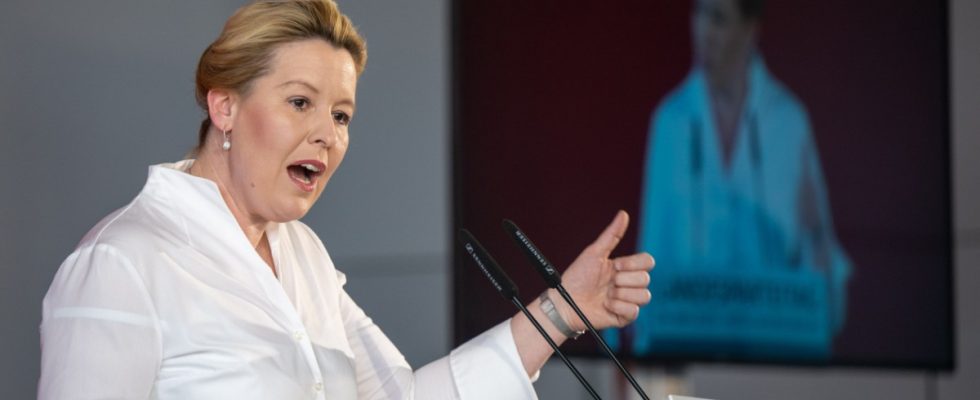The Berlin SPD is struggling to come to terms with its defeat in the parliamentary elections in February. At the first party congress after the repeat election, several delegates expressed their dissatisfaction with the result and with how the party leaders dealt with it after the election. “From our point of view, you have not yet taken enough responsibility for how this election turned out and what situation the SPD is in,” said Juso chairwoman Sinem Taşan-Funke on Friday in the direction of Franziska Giffey and Raed Saleh.
As a consequence of the election result, the state board will have to reorganize itself in the future. The delegates approved the corresponding motion by the Jusos at the party conference in Berlin with only one dissenting vote. In the future, there should be fewer people on the state executive who are also state secretaries, senators or parliamentary group leaders. This should enable them to concentrate more on their task and be independent of working in the parliamentary group or in the Senate.
Originally, the Jusos motion was much stricter, but during the party congress they submitted an amendment and weakened their own demands. In the original version, it was said that the people on the state board should be “not identical” to those who are active in the Senate or parliamentary group. Thus, the two party leaders Giffey and Saleh would have had to give up their party offices. But even now it is quite possible that someone will leave the board in the next board elections in 2024. Because the amended application states that the dual leadership should in future “not entirely” come from the group of people mentioned, i.e. also have a position in the parliamentary group or Senate at the same time. So far, however, both have done so: Giffey is an economics senator, Saleh is a parliamentary group leader.
Apparently, the main intention of the delegates was to draw some sort of conclusion from the poor election result. The motion was therefore the dominant theme of the party congress. She didn’t expect it to be so clear either, says Juso chairman Taşan-Funke. It was “definitely a success” that the Jusos had put the topic on the agenda. It is “very unusual” that a party loses and it just goes on as before.
A so-called “vision process” should help to work out the core of the SPD
How hard the election result hit the party was shown by several speeches. The delegates asked the fundamental questions. What has to happen now? What is the core of the SPD? Very often the sentence was said: It now needs a relentless processing. According to their own statements, the chairmen themselves see it that way. A so-called “vision process” should now help to work out the core of the SPD. This is also part of the approved Juso application.
Giffey said the party failed to live up to its claim to be the leading political force in Berlin. She spoke of a “very bitter experience”. At the same time, she defended the decision to enter into a grand coalition with the CDU. In a coalition with the Greens, massive cuts would have had to be made, said Giffey, and there would have been constant disputes. In addition, a signal would have been sent to the Berliners: We don’t care what you choose, we’ll just continue as before. “I am convinced that in three years we would have gotten the reward for this.”
Giffey: “We’ve been crushed”
In the old, red-green-red coalition, the role of moderator was too often taken on between the extreme positions of the Greens on the one hand and the Left on the other. “We’ve been crushed,” Giffey said. Now you have a coalition agreement with the CDU, “which bears the signature of the SPD to a large extent.” 54.3 percent had voted in a membership decision for the grand coalition with the CDU, almost half of the party was against. The criticism of the decision from within the ranks was and is great.
With 18.4 percent, the SPD had achieved its worst result since the Second World War in the election to the Berlin House of Representatives. In the traditionally SPD-dominated capital, the party was only second behind the CDU, which won 28.2 percent. In addition, the SPD was only 53 votes ahead of the Greens. After the poor election result in 2021, that was a new low.

